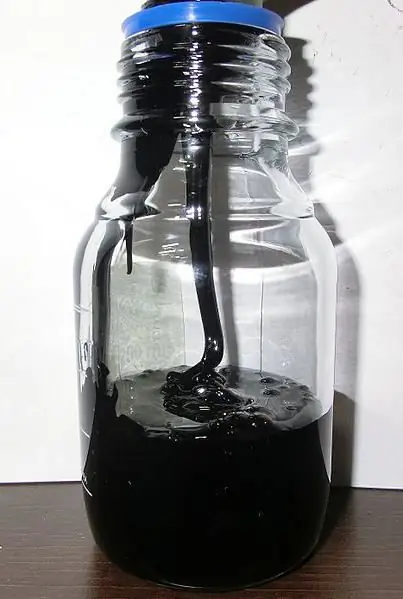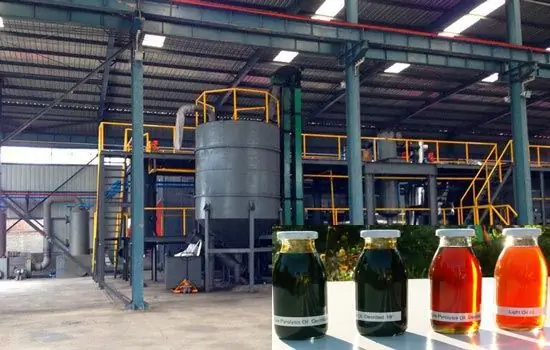2026 Author: Howard Calhoun | calhoun@techconfronts.com. Last modified: 2025-01-24 13:10:26
Each driver periodically faces the need to change the oil in the engine of his car. This procedure can be performed independently, without contacting a service center. However, in this case, the problem always arises - where to put the used engine oil.

Waste oil in waste classification
According to the Federal Waste Catalog Classification (FKKO), used engine oils have the code - 40611001313, referring them to mineral oil waste.
From the content of this code, it follows that "working off" refers to the fourth block (the first digit), which determines that it really is waste that has lost its consumer properties.

The rest of the numbers indicate that used engine oil is a waste oil product that does not contain halogens. It is a liquid type (it contains from 90 to 98% oil products, from 2 to 10% water). Refers to the third hazard class of waste according to the degree of theirimpact on the environment. The third class is considered moderately dangerous. Such waste, with its components, affects the environment, but its recovery occurs relatively quickly, in about 10 years.
Recycling used oils
As mentioned above, "working out" refers to the third class of danger, which indicates its negative impact on people's he alth. As a result, enterprises are required to organize the process of collecting waste motor oil, storing it, and transporting it for processing.
Based on the requirements of the regulatory documents of the Russian Federation, there is a list of waste that needs to be removed, processed or disposed of:
- transformer oils after use;
- lubricating mixtures intended for cooling units and assemblies;
- oil emulsions;
- motor lubricants;
- hydraulic and compression mixtures;
- mineral and synthetic oils;
- industrial oils.
Motor oils that have been through the process of operation are contaminated, lose their properties, which prevents their further use for their intended purpose. They include traces of work in difficult conditions, dangerous impurities: water; chemical components; metal particles; mud of various compositions.

As a result of the above, their recycling process must be carried out in accordance with the established rules for disposal and processing in specializedenterprises.
Recycling content
The refining process is based on the process of filtering and returning the oil to its original properties, bringing it to a working state. These processes involve a series of steps:
- bringing to its original state by regeneration;
- moisture removal;
- thermal cracking;
- removal of solid particles into sedimentary layers.

After the implementation of the above processes, a technical oil suitable for work is obtained again.
What is done with used oil, handling rules
The waste oil drained from the engine, which is usually 4-5 liters, should not be simply poured onto the ground or into garbage cans. Such a procedure will negatively affect the natural environment. In European countries, very large fines are imposed as a result of such actions.
However, used oil drained from the engine, unsuitable for further use in the engine, can get a second life in domestic conditions. Become a helper at home. This product of oil refining has good anti-corrosion properties. It burns great and can also be used effectively as a lubricant.

However, several rules must be observed when dealing with "working off". So, used engine oil must be drained into special, marked containers. Which do not allow it to flow. It is necessary to store "working out" in places that are protected from moisture and sunlight. It is not recommended to reuse containers that have contained used engine oil.
Returning used engine oil for recycling
Currently, there are a sufficient number of companies that specialize in the processing of used oils. Moreover, they pay for each liter, and at the same time I take a working off with a visit to a person who is going to hand over used engine oil.
These structures, in addition to the age of the oil in the "working" state, receive from it a variety of fuels, both diesel and those used in furnaces. The fuel obtained from the "working out" does not contain precipitation, water, which does not lead to pollution of the burners.

Currently in Russia, the average price per liter of used motor oil is in the range of 5 to 7 rubles per liter (when purchased from individuals). From companies (with significant volumes) they buy from 10 to 12 rubles per liter. Addresses of structures where you can donate used motor oil are in the public domain for every person in our country.
Utilization of "development"
Where to take used engine oil? One of the answers to this question is to dispose of it. In Russia, there are specialized enterprises that carry out such activities. However, this method has certain disadvantages, namely:
- The cost of disposing of used engine oil has to be bornecar owner, the person who wants to get rid of it.
- Companies that are engaged in recycling, a relatively small number. Those wishing to hand over used motor oil there still have to look for them in their regions. What's more, they tend to only deal with large volumes of “debriefing” and are also reluctant to interact with individuals.
- Experience suggests that the processes associated with the search for such a company, the import, delivery of used oil take a lot of time.
Based on the above, it follows that oil recycling is not the best option.
You can also dispose of used engine oil by burning it. However, it should be remembered that this must be done without harming the environment. This assumes the availability of special equipment and conditions, as well as the appropriate licensing.
Home use
Craftsmen believe that used oil is an indispensable helper in everyday life. Since the advent of "working off" it has been used as a means to prevent corrosion of metals.
Experienced motorists pour used engine oil into body sills, in which there are no through holes. This oil product is used to process the bottoms and arches of machines. Experts confirm that such use of "working off" allows saving on preparations with anti-corrosion properties.
The use of used engine oil in domestic conditions, its effectiveness is due to the fact that its initial composition is quite universal. So "working out"effectively protects wooden structures from rotting, destruction.
For people who have dachas, suburban wooden buildings, used engine oil will help get rid of mold, fungus and moss in verandas, arbors, on fences. The walls of structures are also impregnated with "working off", but it should be used only on their outer part.
During foundation work, used engine oil is used to prime bituminous coatings, thereby increasing their waterproofing properties. Very high quality prevents rust on metal structures.
Firewood that has been soaked in pre-used motor oil burns very well. They give off a significant amount of heat. However, it should be remembered that when doing this, precautions must be observed.
- Do not use this wood in stoves that have insufficient draft. Due to the high toxicity of motor oil, the consequences can be negative for the human body.
- Due to the same toxicity, the specified fuel cannot be used in residential areas.

Prospects
Currently, the main manufacturers of fuels and lubricants are developing in order to produce reusable motor oils. Such engine oils, after they have been used in car engines, are supposed to be returned to the manufacturer for cleaning. After that, the oil can be used again. It is expected that this method will lead to a significant reductionenvironmental risks and solving the problem of recycling "mining".
Recommended:
What is a transformer used for: features, principle of operation and application

To begin with, let's figure out what a transformer is for and what it is. This is an electrical machine designed to change the voltage. They are different depending on the destination. There are current transformers, voltage transformers, matching transformers, welding transformers, power transformers, measuring transformers. Everyone has different tasks, but they are unequivocally united by the principle of action. All transformers run on alternating current. There are no such DC devices
The most powerful engine in the world. Engine production

Shipping companies sometimes order such powerful machines as supertankers and container ships. They require ever stronger installations, among which is (and occupies the most important place) the motor. The most powerful engine in the world is currently manufactured in Finland by a company called Wartsila. This is a diesel internal combustion unit, the power of which is up to 100,000 kW
Oil is a mineral. Oil deposits. Oil production

Oil is one of the world's most important minerals (hydrocarbon fuel). It is a raw material for the production of fuels, lubricants and other materials
Used oil recycling: equipment and methods of disposal

Full cycle production process with waste recycling minimizes the amount of environmental pollution. Against the background of the popularization of this approach in the industry, technologies for the specialized utilization of products of industrial activity are also emerging in order to form new raw materials. These processes include the processing of used oil, which results in fuel
How is oil produced? Where is oil produced? Oil price

Currently, it is impossible to imagine the modern world without oil. It is the main source of fuel for various transport, raw materials for the production of various consumer goods, medicines and other things. How is oil produced?

